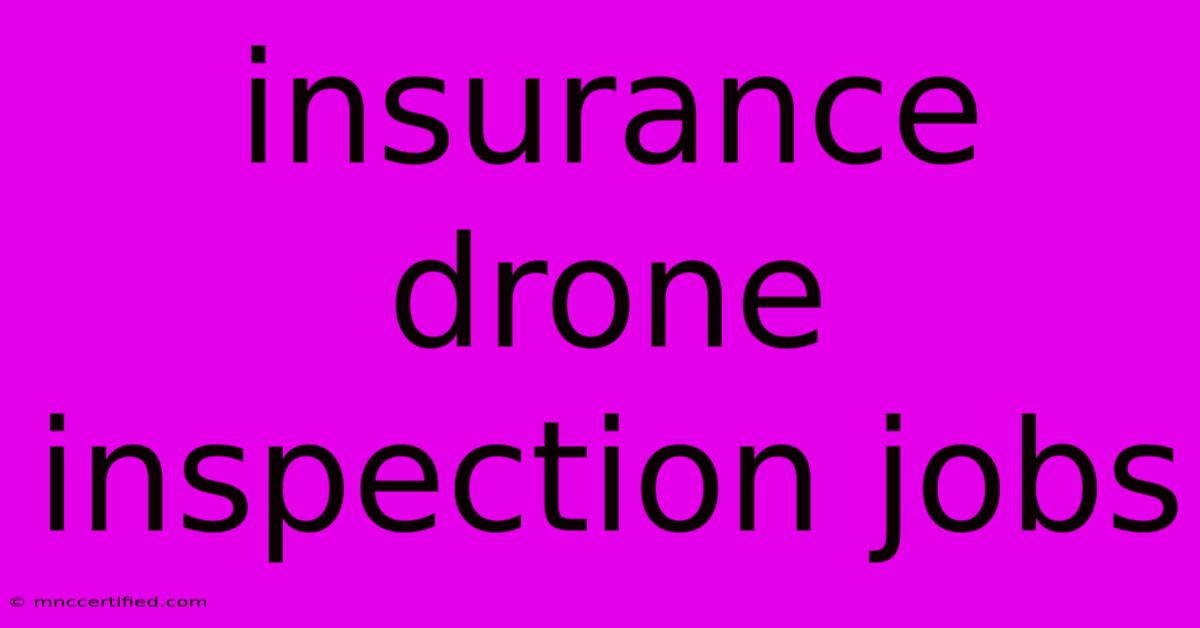Insurance Drone Inspection Jobs

Table of Contents
Soaring High: The Growing Demand for Insurance Drone Inspection Jobs
The drone industry is booming, and one of the fastest-growing sectors is insurance. Drone inspections are revolutionizing how insurance companies assess property damage, offering speed, efficiency, and cost savings. This creates a wealth of exciting opportunities for individuals looking for insurance drone inspection jobs. This comprehensive guide explores this burgeoning field, covering everything from required skills and certifications to job prospects and salary expectations.
The Rise of Drones in Insurance
Traditional methods of property inspection, often involving lengthy site visits and manual assessments, are slow and expensive. Drone technology offers a superior alternative. Equipped with high-resolution cameras and advanced sensors, drones can quickly and safely capture detailed imagery and data of buildings, infrastructure, and other assets. This allows insurance adjusters to:
- Assess damage accurately: Drones provide detailed visual data, allowing for precise estimations of damage from events like hailstorms, wildfires, or accidents.
- Reduce inspection time: Drones significantly cut down on the time needed for inspections, speeding up the claims process.
- Improve safety: Inspecting hazardous or inaccessible areas becomes safer with drones, eliminating the need for risky manual inspections.
- Lower costs: Reduced inspection times and improved efficiency translate to lower operational costs for insurance companies.
These advantages have led to a rapid increase in the demand for qualified professionals capable of conducting drone inspections for insurance companies.
Essential Skills and Certifications for Insurance Drone Inspection Jobs
Landing a job in this field requires a blend of technical skills and practical experience. Here's what employers typically look for:
Technical Skills:
- Drone piloting proficiency: Mastering the safe and efficient operation of various drone models is paramount. This includes understanding flight regulations and emergency procedures.
- Data acquisition and processing: You'll need skills in capturing high-quality aerial imagery and video, using different camera settings to suit various inspection needs. Post-processing skills using software like Pix4D or Agisoft Metashape are also crucial for creating 3D models and orthomosaics.
- Photogrammetry and 3D modeling: The ability to create accurate 3D models from aerial imagery is a highly valuable skill.
- Data analysis and reporting: Transforming raw data into concise, informative reports for insurance adjusters is a critical aspect of the job.
- Software Proficiency: Familiarity with drone flight planning software, image processing software, and potentially GIS (Geographic Information Systems) software is beneficial.
Certifications:
While not always mandatory, certain certifications significantly improve your chances of securing an insurance drone inspection job. These include:
- Part 107 FAA Remote Pilot Certificate (USA): This is the essential certification for commercial drone operation in the United States. Equivalent certifications exist in other countries.
- Industry-Specific Certifications: Some organizations offer specialized training and certifications in drone inspections for insurance, which can demonstrate your expertise to potential employers.
Finding Insurance Drone Inspection Jobs
The job search process involves utilizing various platforms and networking strategies:
- Online Job Boards: Sites like Indeed, LinkedIn, and specialized drone job boards often list openings for drone pilots in insurance.
- Direct Application: Contacting insurance companies directly and inquiring about their drone inspection needs can be effective.
- Networking: Attending industry events and connecting with professionals in the drone and insurance sectors can lead to valuable opportunities.
- Freelancing Platforms: Platforms like Upwork and Fiverr offer opportunities for freelance drone inspection work, allowing you to build experience and establish your reputation.
Salary and Career Progression
The salary for insurance drone inspection jobs varies depending on experience, location, and the size of the company. Entry-level positions may offer competitive hourly rates or salaries, with significant earning potential as you gain experience and expertise. Career progression might involve specializing in particular areas, like roof inspections or large-scale infrastructure assessments, or moving into managerial roles within an insurance company’s drone operations team.
The Future of Insurance Drone Inspection Jobs
The demand for qualified drone pilots in the insurance industry is expected to continue growing. As drone technology advances and insurance companies increasingly adopt this efficient inspection method, more opportunities will arise. By acquiring the necessary skills and certifications, individuals can position themselves for success in this exciting and rapidly evolving field. Embrace the future of insurance; take flight with a career in insurance drone inspections.

Thank you for visiting our website wich cover about Insurance Drone Inspection Jobs. We hope the information provided has been useful to you. Feel free to contact us if you have any questions or need further assistance. See you next time and dont miss to bookmark.
Featured Posts
-
Farmers Insurance Credit Rating
Nov 26, 2024
-
Valleys Thanksgiving Message
Nov 26, 2024
-
Erie Insurance Shepherdstown Wv
Nov 26, 2024
-
Celtics Clippers Game Time And Tv
Nov 26, 2024
-
Barbara Taylor Bradford Dies At 91
Nov 26, 2024